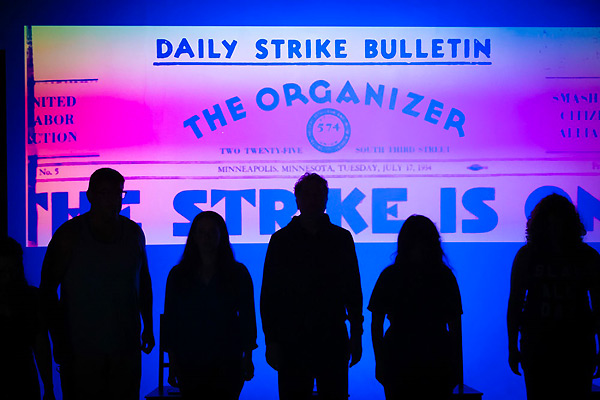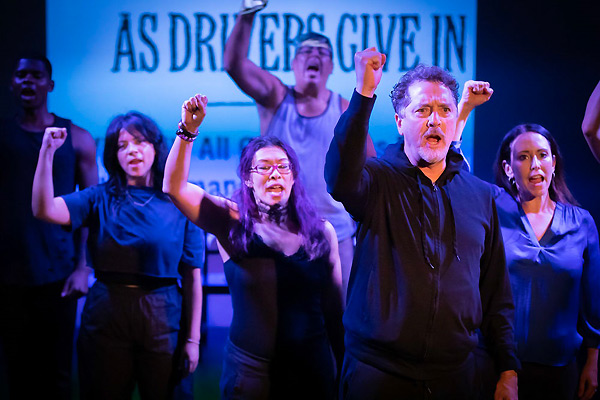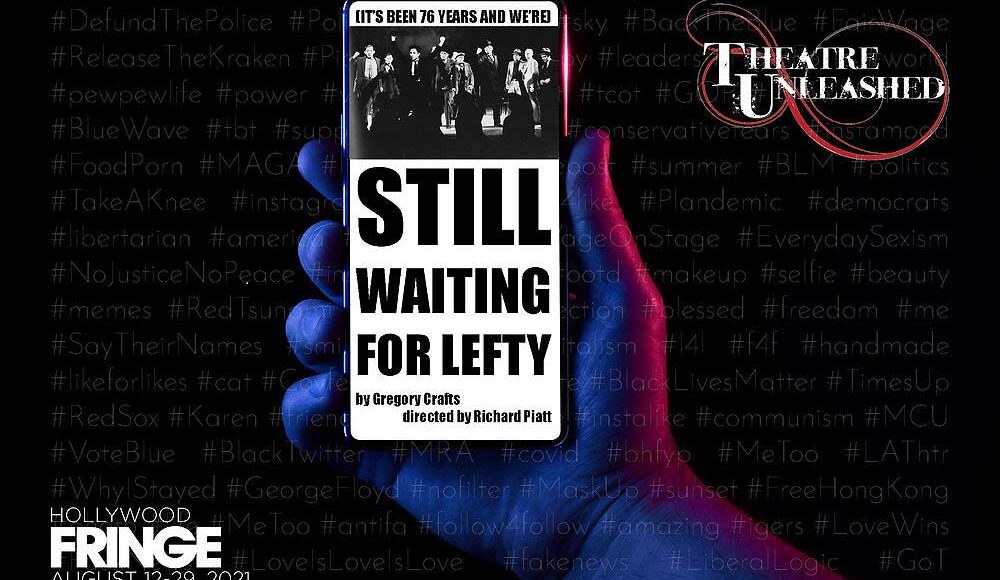By Ernest Kearney — In 1935 Waiting for Lefty hit the Great White Way with slightly less of an impact than the massive comet which put the period to the rule of the dinosaurs some 66 million years ago.
The impact is understandable when you look at the theatre of New York from then. 1935 saw 163 shows open on Broadway. Half-a-dozen were revivals of Shakespeare or Gilbert and Sullivan, but most were new works now utterly forgotten.
Even their titles are baffling: The Simpleton of the Unexpected Isle, Crime Marches On, How Beautiful with Shoes, Weep for the Virgins, Achilles Had a Heel. The scant few known today are remembered mainly from the films Hollywood made based on them; The Petrified Forest, Parnell.
Clifford Odets’ Waiting for Lefty shook Broadway to its core because it was so unashamedly anti-Broadway in nature.
Odets’ drama was taken from the headlines, about a strike among the New York cabbies that only months earlier, all but, crippled the city. In a period of massive sets and pageantry, his play called for a bare platform, no scenery, and an almost expressionistic style. When stilted, flowing prose was the staple of the day, Odets fashioned his dialogue from the argot of the street, tinted with dialects of the working class, and gave it a poetic pinch of his own devising.
The posh New York audiences came expecting a tidy parlor drama, Odets assaulted them with class warfare, proletarian drama and agitprop.

The opening night audiences gave the play 28 curtain calls then poured out onto the street determined to join the revolution. Unfortunately, that determination faded by the time most of them got into their limos to head home. (*)
A prominent New York critic praised Odet’s work and intoned, “A play like this does not die.”
Maybe not, but it certainly does wither.
Today most non-theatre folks are, only, familiar with Clifford Odets —if at all— as the inspiration for the Coen Brother’s 1990 film Barton Fink.
With (It’s Been 76 Years and We’re) Still Waiting for Lefty, Playwright Gregory Crafts has taken up the challenge of rekindling that theatrical fire Odets set, by mirroring the dramatic structure of his 1935 play to reflect Crafts’ own social rage through a prism of today’s contemporary issues. After a brief history of Odets and his play, —perhaps the most entertaining segment of his effort— Crafts sets about emulating the loose configuration of Odets’ episodic play.
Crafts’ first scene, like that of Odets’, is between a husband (Joe Luis Cedillo) and wife (Leesette Gloria Medina) arguing over the possibility of a strike and what it would mean to their financial survival. Crafts, for relevance, makes the household that of new emigrants.
Odets’ work has a confrontation between an industrialist and a lab assistant, whose loyalty the mogul first praises and rewards before informing the assistant he’s been assigned to work on a deadly new gas for use by the military.
Crafts revises the confrontation to be between a smarmy Senator (Patrick Randolph) cut from the cloth of Strom Thurmond and an ambitious, young, black congressional aide (Ethan Williams).

The Senator entices him to join his staff. No sooner does the young aide agree, than the Senator reveals he’ll be the legislative point man on a bill aimed at curtailing minority voters’ access to polling sites.
In another of Odets’ vignettes a brother tries to convince his sister to break-up with her impoverished cab driving boyfriend.
Crafts also has a brother and sister confrontation, but his concerns a brother (Michael Lutheran) seeking a reconciliation with his gay sister (Courtney Bell) who denounces his Republican politics as a direct attack on her and her lifestyle.
Odets pens a scene between a young doctor challenging a senior staff member over the closing of the hospital’s charity ward.
Crafts refashions this into a confrontation between a mother and daughter when the mother (Soda Persi) learns of charges of sexual harassment the daughter (Rena Carter) has made against the head of the corporation she works at.
It is admirable of Crafts, seeking to fan the flame for social justice that once burned like a conflagration in this nation and is now barely a spark from an over-flicked Bic.
However this effort should have begun and ended as a writer’s exercise.
Like the Odets’ play, Crafts’ foils are too pat. While he has avoided, for the most part, the cartoonishness of Odets’ evil “capitalists” and the flat nobility of his “workers,” Crafts has still lapsed into other stereotypes, just more modern ones.

Confining himself to Odets structure has also worked against the Playwright, in that some of the episodes seem misshapen by the Procrustean bed of Crafts dramatic needs rather than being allowed a natural growth.
Crafts is served well by both his cast and Director Richard Piatt, unfortunately their best efforts have been undone by the Playwright and Odets.
A BRONZE MEDAL.
(*) NOTE: It also faded for Odets, who when called before the House Committee on Un-American Activities in 1947, named names and denied his membership in the Communist Party.
_____________________________________
* * *
It’s Been 76 Years and We’re) Still Waiting for Lefty
has been extended at the Hollywood Fringe Festival 2021
For Tickets, Show Updates and Additional Information Go To:
Thursday September 9 2021, 7:00 PM | 80 mins
Pacific Time (US & Canada) studio/stage (Main Space)520 N. Western Ave. Buy Tickets
Learn More at StillWaitingForLeftyPlay.com





